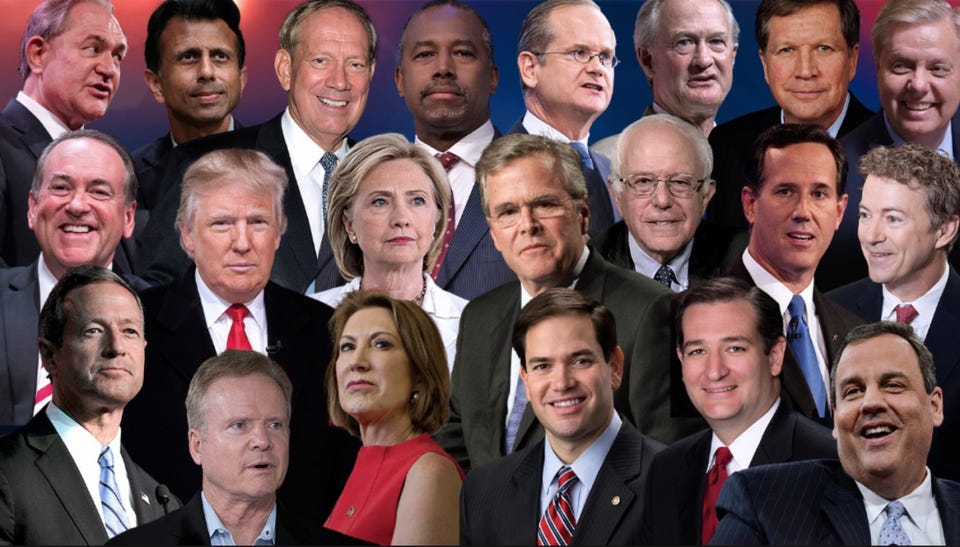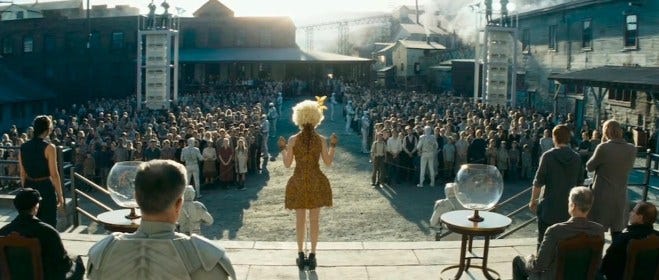Politics and Leadership
The Puzzle of 2016
I try not to spend too much time talking about contemporary political figures, as they'll go by the wayside soon enough. But the phenomenon of Trump and his 2016 victory is particularly interesting, for understanding America, and politics, and democracy. Many seasoned political experts were caught by surprise and puzzled. Many explanations have been offered (including some by me). I regret to say that I'm going to add to that pile now.
First, I think we should remind ourselves that the election was close, who won was partly a matter of chance, and therefore whatever conclusion you draw about "what this tells us about the American voter" should be one that you would draw regardless of who actually claimed the victory. If the weather had been different on election day, the outcome might have been different. But we'd still have the same basic question. Trump turned out to be far more popular and far more politically viable than almost any expert anticipated.
Maybe the biggest thing the case demonstrates is the chasm between the attitudes of the elites of our society and the attitudes of the masses.
Semantic note: "Elite" has an unusual sort of meaning. On the one hand, "elite" in many contexts means "extra good". On the other hand, "elitist" is a term of censure in American politics. Anyway, I use it purely descriptively, not evaluatively. The "elites" are just the class of people who have unusually high influence, social status, and/or resources in society -- for better or worse. The "masses" are everyone else.
Elites expected Trump to fail, and many continue to expect that, in part because most elites themselves found the idea of supporting Trump unimaginable. But a large portion of the masses turned out to have no trouble supporting him wholeheartedly. The elites (myself included) then started, as elites are wont to do, to develop theories about why this was so.
Most of these theories are at least somewhat intellectual explanations, that is, they cite aspects of the content of Trump's message, or other ideas and values that (half of*) the masses allegedly believe in, that would tend to support voting for Trump. For example, perhaps the masses are largely racist, and they embraced a racist message that they heard in Trump's speeches. Or perhaps they are merely nationalist. Or they believe that most Washington insiders are corrupt, and thus they preferred an extremely unconventional candidate. Or they have simply taken a very strong turn against left-wing political beliefs.
*Hereafter, I omit the qualifier "about half of".
It's Not About Belief
I don't deny that these sorts of things have some influence, of course. But I think we elites vastly overemphasize them, when we try to understand voting patterns. We do this because we confuse the masses with ourselves.
I started to think this during the campaign, when I saw Republican voters preferring Trump over 15 other candidates. The Republican party was supposedly the conservative party, but ... a person who was motivated by conservative beliefs obviously had many better choices. (And indeed, the people who were really serious about conservative beliefs were outraged by Trumpism. E.g., George Will abandoning the Republican party after a lifetime as a member.)
Furthermore, I heard that Trump's support was strongest among evangelical Christians. This is striking because Trump is extremely far from being a good Christian. Indeed, if you believe in Christian virtues, it would be hard to find a less suitable exemplar than Trump.
No doubt it is still possible to come up with intellectual (belief-based) explanations for Trumpism. Maybe the putative evangelical Christian conservatives believe so strongly in the need to stop Mexican immigrants that this just overrides all other considerations. But we never thought this was the case before Trump came along, and it's kind of a weird belief system for someone who professes Christianity to have.
So what is it?
Leadership Types
I think a large portion of voters vote, not based on political ideology, but based on perceived leadership personality. They have a general, implicit sense of what "a leader" is like, and they pick the candidate who strikes them as most leader-like.
Now, why would people do that? Don't they know that ideology is more important?
Well, in fact it might be rational to disregard ideology. Most people have minimal knowledge about policy issues, and they know this fact about themselves. They have no intention of learning enough political information to evaluate competing policy proposals and overall ideological stances, either, since doing so is extremely time-consuming, possibly also very boring, and they know their vote almost certainly won't make a difference anyway. So they may not have enough political beliefs to base a vote on (nor should they). (Pollsters sometimes drag "opinions" out of them, but these opinions are not held very seriously.) So they might as well just vote for whomever they feel like.
There are, of course, different sorts of leaders. Some are not natural leaders but just do the job because circumstances thrust it upon them (like most academic department chairs). Some leaders are consensus builders who try to lead by smoothing over differences and making everyone feel respected. Others lead by manipulating things behind the scenes. Others lead by flattery (most politicians). And still others lead by brute force.
The last is the "strongman" type. This type has an aggressive, extremely confident, fearless disposition. The strongman does not try to build consensus, but to crush opponents and force everyone to submit to his will.
Now, I'm not saying that everyone wants a strongman. But a large portion of people perceive that as the most genuine type of leader. Enough people, perhaps, to let a strongman figure triumph in an election, almost regardless of other considerations, provided that there is no challenger who has anywhere close to as much of the strongman personality traits.
Love for the Strongman
Why would anyone choose a strongman over more benevolent types of leaders? Isn't that just obviously against one's own interests?
Conjecture: it's an evolutionary adaptation. Throughout our evolutionary past, going back to even before there were humans, our ancestors always lived with social hierarchies. Every society has them. Some people/primates control the resources and wield power over others.
The dominant primates, the ones who wield the most power, have generally been strongman type personalities, for obvious reasons. The dominant primate is the one who physically defeats others in combat. This requires an aggressive, low-empathy, highly confident personality, in addition to physical size and strength. Millions of years of evolution have thus conditioned us to think that this is what a leader is.
But, again, why would you actually choose such a leader, if you have a choice? Well, faction-forming has also probably been with our ancestors going back hundreds of thousands or millions of years. You choose a faction in order to get ahead. And when you do so, you want to choose the winning faction. It's no good allying yourself with a would-be leader who is going to be defeated. If you're not yourself going to be the leader, you have to ally yourself with the primate who is going to come out on top, in order to succeed in the society ruled by that leader.
So when we see a contest for a leadership role, something deep inside our brain whispers to us,
"Ally yourself with the strongman."
"Choose the one who is most likely to kill the others."
That thing isn't the only force deciding our votes, thankfully. To some extent, we also consciously reason about who is likely to actually produce benefits for us and our society. But that little voice inside will sometimes get its way -- especially when there is one candidate who is far and away the most aggressive.
Of course, few if any voters explicitly, consciously say to themselves, "I think I'll vote for the strongman." The little voice doesn't literally speak to us. What it does is give us a general emotional attitude. When a candidate starts displaying strongman personality traits, we find ourselves feeling positively disposed toward him, we know not why.
But we quickly start to confabulate -- that is, we start finding reasons to feel favorable towards that person. We look at aspects of the person's message, or other information we have about him, for reasons why we might like him. There is always something we can come up with. When a pollster interviews us, we will say some of these reasons that we came up with. We won't say, "It's because he feels to me like the primate most likely to physically destroy the others," even if that's the truth.
The Irony of Democracy
This is the loophole -- or rather, one of the loopholes -- that enables democracy to be exploited with terrible results. In theory, democracy may trample on the rights of the minority, but at least it ought to ensure that leaders are chosen who do a non-terrible job of serving the interests of at least a majority of the people.
In theory. But only if you forget some unfortunate aspects of human psychology and model humans as well-informed, instrumentally rational choosers.
The problem is that we have inborn preferences, including especially the preference for strongman leaders, which are not only uncorrelated with the objective quality of leaders, but are actually strongly anti-correlated with leadership quality. We have a preference for the type of personalities that, when given power, are most likely to use it to exploit and harm others -- people who are aggressive, over-confident, and low in empathy. Indeed, such people are the most likely to undermine democracy.
These sorts of instinct-based preferences, I would conjecture, are more pronounced among the masses, as compared to the elites of our society. For this reason, it is the preferences of the masses that are the greatest threat to the masses. The elites are needed to protect the masses from themselves. If the masses get exactly what they want in the short term, they will gladly surrender their liberty, surrender democracy, and submit themselves and their descendants to a tyrant. (For more, see this book, from which the title of this section is taken: The Irony of Democracy.)







